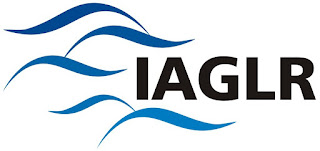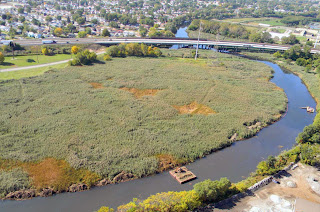Category:
New video offers insight into Great Lakes investment
May 29th, 2013 by Irene MilesIn the news: Teachers identify the good and the still needed in Great Lakes literacy education
May 28th, 2013 by Irene MilesDozens of Michigan teachers were some of the attendees at the 2013 Great Lakes Conference at Michigan State University back in March, and one of the most important topics of discussion was the current and future need for improving Great Lakes literacy.
From the MSU office of extension:
“At the luncheon, educators learned about upcoming professional development opportunities relating to the Great Lakes, and shared their best practices in Great Lakes education, as well as their priority needs relating to advancing Great Lakes literacy in the classroom.
So with the goal of advancing Great Lakes literacy in mind, what were some of their best practices and needs that emerged from the teacher discussion? The best practices clustered around five themes: 1) curriculum, 2) place-based education, 3) data in the classroom, 4) hands-on learning, and 5) cross-curriculum lessons…”
Follow the link above to read the complete article, including links to further information for educators.
Food web complexity one of several panel topics at upcoming 2013 IAGLR conference
May 22nd, 2013 by Irene MilesPresentations will discuss a range of issues that help determine just what eats what in the lake. Several will focus on what happens to the diet of native species when invaders like quagga mussels, round goby, spiny water flea deplete food resources. Others will introduce how shifts in phosphorus and other nutrient levels may be behind recent changes at the bottom of the food web and compare the eating habits of forage fish over the last two decades.
The session is a part of ongoing regional efforts to improve understanding of the complicated relationships between the many different microbes, plants, and animals that call Lake Michigan home. Since 2010, IISG and other partners in the Great Lakes Regional Research Information Network have funded several studies on the links that form the food web.
In addition to serving as co-chair, Tomas will join researchers from across the Great Lakes to present the findings of three studies slated for the session. For a description of these and other presentations, visit the session schedule and click on the presentation titles.
The International Association for Great Lakes Research’s (IAGLR) 56th Annual Conference on Great Lakes Research is sponsored by IISG and Purdue University. To view the entire program, visit the conference website.
In the news: Scotts leads the way in removing phosphorous from fertilizers
May 16th, 2013 by Irene MilesPhosphorous is a nutrient that has been linked to significant runoff problems and excessive algal growth in water bodies including the Great Lakes. Recently, Scotts Miracle-Gro announced that they will be removing phosphorous from their line of lawn fertilizers to address the issue and help reduce nutrient pollution problems.
From The Columbus Dispatch:
“The Marysville maker of lawn-and-garden products sees the move as a milestone for its industry, which it says is partly responsible for the phosphorus runoff that feeds one of the nation’s most costly and challenging environmental problems — nutrient pollution.
‘As consumers feed their lawns this spring, they should know they can get great results from our products while also protecting and preserving our water resources,’ said Jim Lyski, Scotts’ chief marketing officer, in a written statement.
Harmful algae blooms in coastal areas of the United States are estimated to have a yearly negative economic cost of at least $82 million, mostly because of their effects on public health and commercial fisheries, according to a 2006 report by the National Centers for Coastal Ocean Science.’
Follow the link above to read the complete article, and visit our Lawn to Lake websitet to learn more about runoff issues and natural lawn care solutions.
IAGLR 2013 panels to focus on new and historic contaminants
May 15th, 2013 by Irene MilesIISG’s Laura Kammin will co-chair a two-part session on the impacts and management of contaminants at this year’s Conference on Great Lakes Research, June 2-6 at Purdue University. Researchers will present on a range of issues, including contaminant testing, impacts to wildlife, and pollution trends over time. With 24 presentations spread over two days from researchers, resource managers, and industry representatives, it will be the conference’s largest session.
IISG in the news: Teachers and students enhance science class with underwater robots
May 14th, 2013 by Irene MilesThe SeaPerch Program, sponsored by the Office of Naval Research, brings robotics and underwater science together to enhance classroom activities and curricula for a variety of grade levels. Illinois-Indiana Sea Grant recently sponsored a contest to give away several of the kits to teachers of grades 6-12.
From The Great Lakes Echo:
“The Illinois-Indiana Sea Grant offers grade 6-12 teachers a chance to win a free kit to build a remotely operated underwater vehicle. The SeaPerch kit normally costs $194.SeaPerch, a program started about five years ago by Massachusetts Institute of Technology professors, provides remotely operated underwater vehicles and lesson plans to teachers to improve the curriculum in science, mathematics and engineering in primary education across the country.”
AIS Outreach Team highlighted in NOAA Spotlight article
May 10th, 2013 by Irene MilesIllinois-Indiana Sea Grant’s Aquatic Invasive Species (AIS) outreach team was recognized along with many other collaborators in a NOAA Spotlight article for their work on the Great Lakes Risk Assessment Tools. This tool estimates the potential invasiveness of species being sold for use in trade and hobbies such as aquaculture, live bait, and water gardens etc. It provides insights for resources managers that may guide future policies with the goal of preventing the spread of invasive species. This is also a tool that hobbyists and people working in the trades can use proactively use to help choose less threatening species. IISG “will be talking with retailers, hobbyists, and water gardeners – going to shows and posting information in stores – about how they can use the risks assessments as a guide to get ahead of regulations and make responsible decisions now,” said Pat Charlebois, IISG AIS Coordinator.
New section of Grand Calumet river restoration work begins
May 6th, 2013 by Irene Miles“Work will start April 22 on a project that will dredge (remove) or cap (isolate from the ecosystem) 1.2 million cubic yards of river bottom sediment contaminated with PAHs, oil & grease, PCBs, and heavy metals like cadmium and copper. Volume-wise, this would fill about 300 Olympic-sized swimming pools. Along with restoration of more than 50 acres of wetland habitat, this work will take place for approximately three years from Kennedy Ave to Cline Ave…This work is funded by US Environmental Protection Agency, Indiana Department of Environment, and Indiana Department of Natural Resources, in partnership with US Fish and Wildlife Service, The Nature Conservancy, Shirley-Heinze Land Trust, Save the Dunes, municipalities, and other local and federal partners. The US Army Corps has also begun dredging in the Indiana Harbor and Ship Canal, and is on track to dredge 300,000 cubic yards through August this year.”
IISG summer intern continues working on Great Lakes issues
May 3rd, 2013 by Irene Miles“This past summer I was lucky enough to intern with the Illinois Indiana Sea Grant and rediscovered my love of marine sciences. My internship taught me a great deal about freshwater ecosystems and problems that are occurring in the Great Lakes. I was able to learn so much about the Great Lakes ecosystems, limnological studies, and nutrient levels, and I gained hands on experience working on the US EPA R/V Lake Guardian research vessel collecting nutrient and biological samples. The internship also allowed me to work at the Illinois State Fair and educate the public about the many issues facing the Great Lakes. It was a great feeling to spread the word about how we can all make a change in our behavior so that we can make a difference in our environment! I am currently interning with Oak Ridge Institute of Science and Education (ORISE) and continuing to work on Great Lakes projects and take samples from the Great Lakes on the US EPA R/V Lake Guardian. The Illinois Indiana Sea Grant internship really helped further my contacts in the industry by networking and meeting people working in different areas of the Great Lakes. Illinois Indiana Sea Grant really opened my eyes to a whole new field and career opportunities. I cannot thank them enough!”
Recent News
- Sea Grant Chats: Looking back on our AIS legacy as we move forward
- National Sea Grant welcomes 2026 Knauss Marine Policy Fellowship finalists
- IISG’s new year starts with a new research and reporting coordinator
- Ripple Effects curriculum engages students on the spread of aquatic invasive species
- Coastal communities can tap into IISG resources as they manage beach sand and structures
IISG Instagram
🚨Attention Educators🚨Saturday, February 28th at 11:59 pm CT is the deadline to apply for the Shipboard Science Immersion on Lake Superior.
Learn more and apply today at the link in bio.
This program is made possible by Illinois-Indiana Sea Grant and CGLL with funding and support from EPA, NOAA, and the Great Lakes Restoration Initiative.

Managers and researchers can be faced with a need to classify the risk of new crayfish invaders. Rapid assessment tools, such as the Science-based Tools for Assessing Invasion Risk (STAIR), can assist in this process by providing a streamlined framework for analysis and decision-making.
Join us for an ICC webinar with John Bieber from Loyola University Chicago to learn how rapid assessment tools are used to classify invasive species risk and how STAIR can support invasive crayfish management.
Learn more at the link in bio.

Join us for a hands-on @projectwet Make-and-Take Workshop in Chicago!
📅 When: March 12, 2026 from 9:00 AM – 3:30 PM CT
📍 Where: 200 S Wacker Dr., Chicago, IL
💲 Cost: $25 (includes classroom-ready activity kits, lunch & refreshments)
🗓️ Registration closes February 26.
✅ Open to 3rd–8th grade formal & informal educators
✅ Earn 6 PD hours
✅ Leave with ready-to-use water education kits aligned to Common Core & NGSS
👉 Don’t miss out—space is limited!
Learn more and register at the link in bio.

Explore the history, impact, and educational power of Meaningful Watershed Educational Experiences (MWEEs).
eeLEARN: MWEE 101 is a free, self-paced online course that walks you through the MWEE framework with examples, planning tools, and downloadable resources that you can use immediately.
Start learning today at the link in bio.

Categories
- Aquaculture
- Aquatic Invasive Species
- Buoys
- Climate Ready Communities
- Coastal Resilience
- Director's Blog
- Education
- Featured
- Fellowships
- Fisheries
- Funded Research
- Funding
- Great Lakes Cleanup
- Great Lakes Data
- Healthy Waters
- Internships
- Jobs
- K-12 Education
- News
- Photos
- Program
- Recreation & Tourism
- Resources
- Sea Grant Scholars
- Stormwater & Green Infrastructure
- Sustainable Community Planning
- The Helm
- Uncategorized
- Video
- Water Resource Economics




